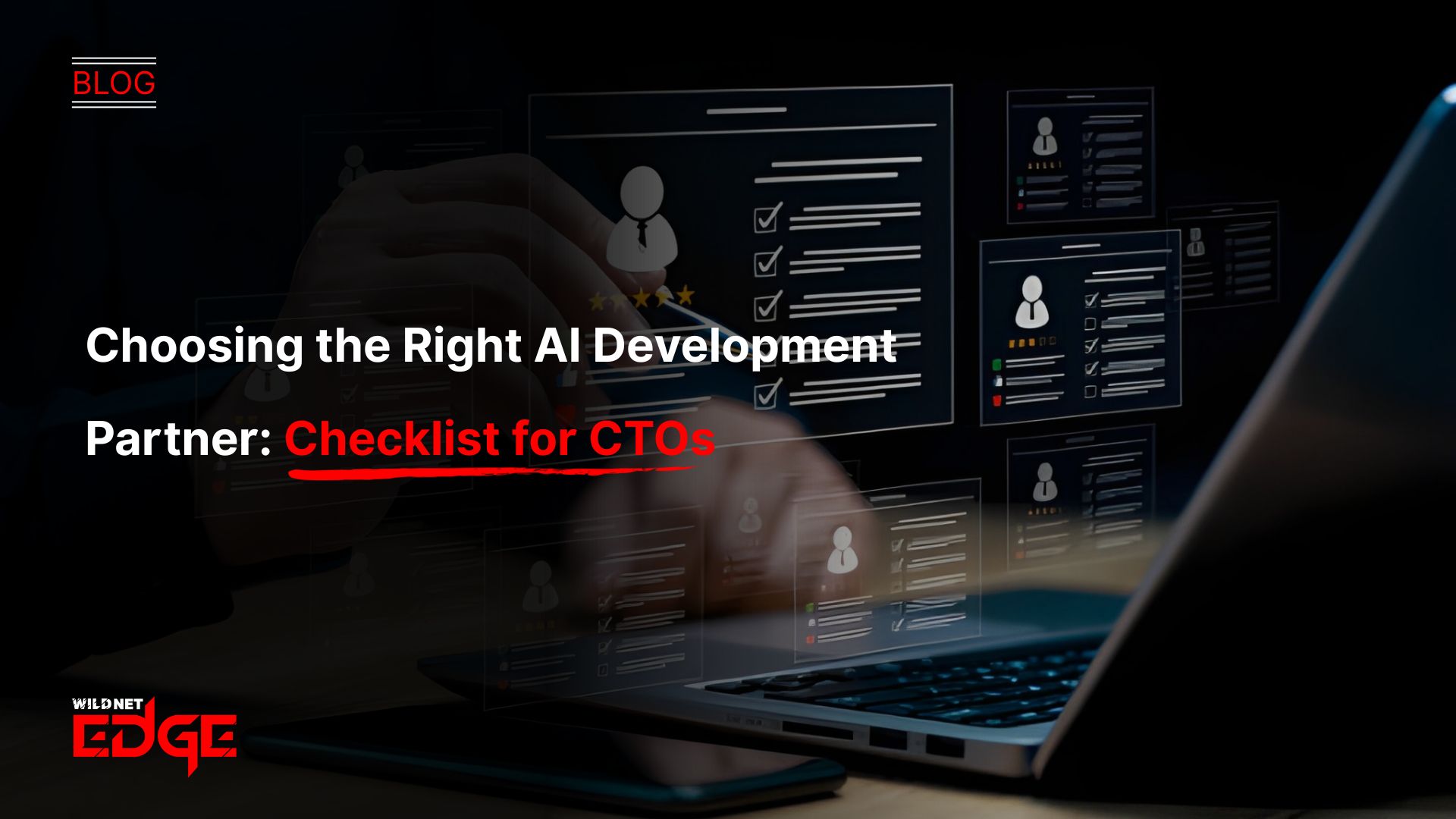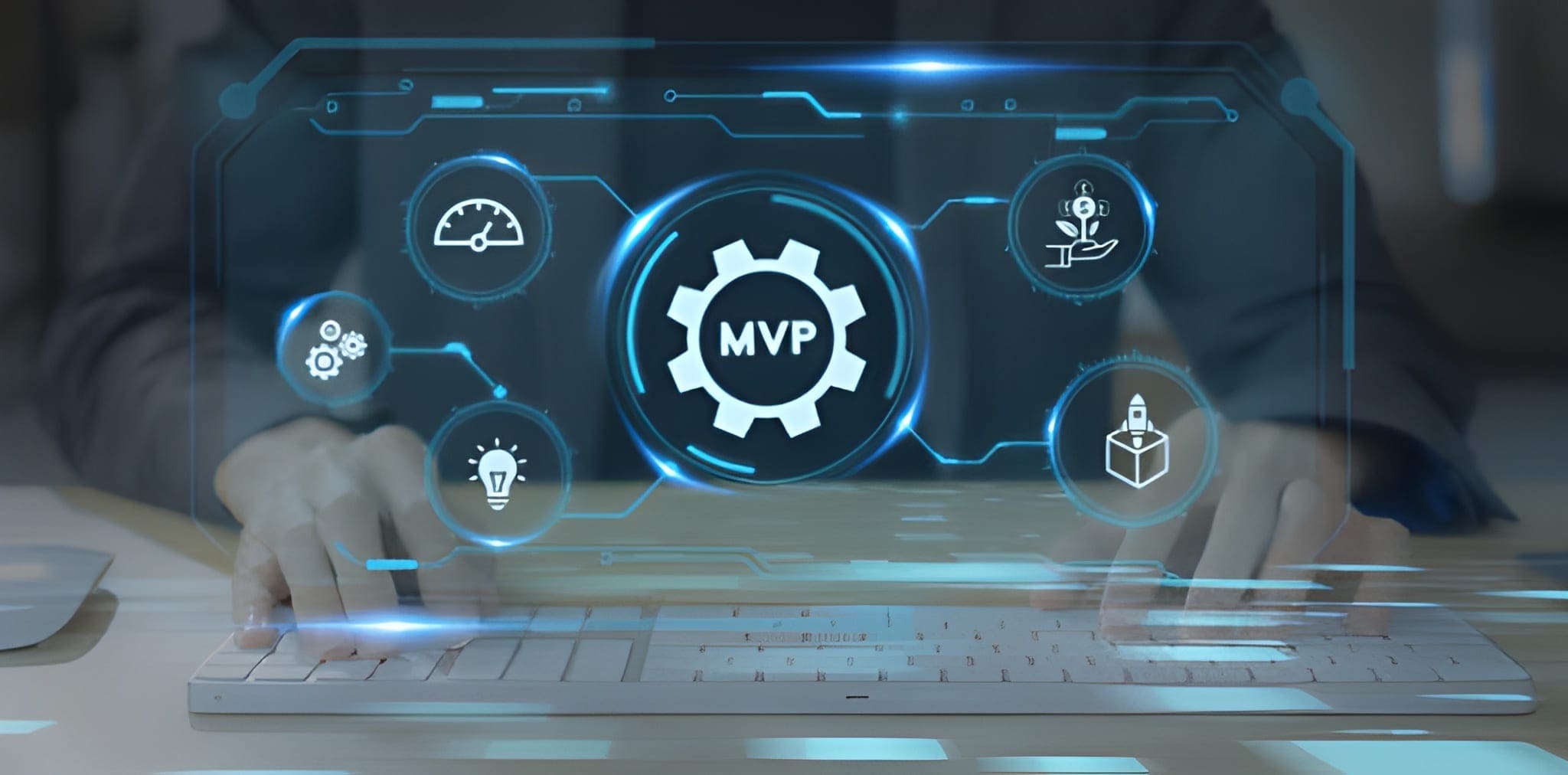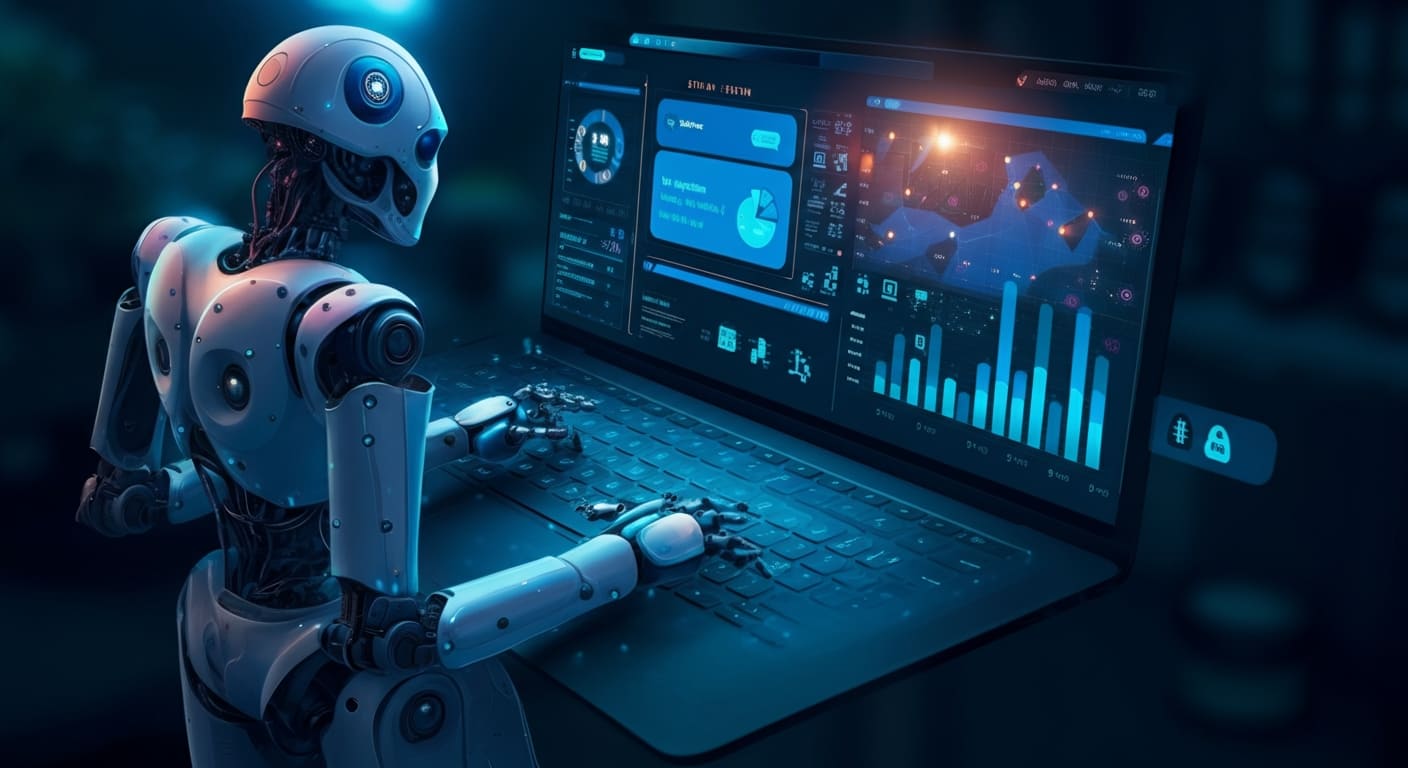TL;DR
This article provides a crucial checklist for CTOs focused on AI development company selection. It emphasises that choosing the right partner is vital for mitigating risks and ensuring the success of complex AI initiatives. The guide outlines key criteria for AI partner evaluation, including deep technical expertise in specific AI domains, proven experience with similar projects, mature development methodologies (Agile, MLOps), and robust security and compliance practices. It also covers assessing communication protocols and cultural fit. This AI services evaluation checklist helps technical leaders conduct thorough due diligence, ensuring the chosen vendor can deliver scalable, reliable, and strategically aligned AI solutions.
As a Chief Technology Officer, integrating artificial intelligence into your enterprise strategy is no longer a question of if, but with whom. Your AI initiatives’ success hinges critically on your development partner’s capabilities, processes, and reliability. Choosing the wrong vendor can lead to costly failures, security breaches, and stalled innovation. A rigorous, methodical approach to AI development company selection is therefore paramount for navigating the complexities of AI and ensuring your projects deliver tangible business value.
Why Choosing the Right AI Development Partner Matters
Unlike standard software development, AI projects often involve:
- Greater Uncertainty: Research and development are often required, making outcomes less predictable than traditional builds.
- Specialized Expertise: Skills in specific AI domains (NLP, computer vision, reinforcement learning), data engineering, and MLOps are scarce and highly specialized.
- Data Sensitivity: AI models are trained on potentially vast and sensitive datasets, demanding exceptional security and governance practices.
- Ethical Considerations: Bias, fairness, and explainability are critical concerns that require careful handling.
These factors elevate the importance of choosing AI development vendor carefully. You need a partner with not just technical skills, but also strategic foresight and operational maturity.
The CTO’s AI Services Evaluation Checklist
When vetting potential AI partners, move beyond surface-level presentations and dig into these crucial areas:
1. Deep Technical Expertise & Proven Track Record
- AI/ML Specialization: Do they possess specific AI skills that are clearly demonstrated and that correspond to your project (for instance, deep learning for image recognition, transformers for NLP)? It is not enough to make general statements.
- Data Engineering Capabilities: Are they capable of doing all the steps such as making the data pipelines, doing feature engineering, and making sure of the quality of the data? In AI, data work accounts for 80% of the work.
- MLOps Maturity: Do they have the experience to deploy, monitor, and retrain models in production? Inquire about their MLOps tools and procedures.
- Relevant Case Studies: Have they done projects of the same complexity and size successfully, preferably in your sector? Demand detailed and verifiable examples.
2. Development Methodology & Process Rigor
- Agile Integration: How do they incorporate AI development (which can be experimental) into an Agile framework (Scrum/Kanban)?
- Project Management: What tools and processes do they use for tracking progress, managing tasks, and communicating status? Look for transparency.
- Quality Assurance: How do they test AI models for accuracy, robustness, and bias? What is their QA process for the surrounding software application?
- Communication Protocols: How often will you communicate? Who are the key points of contact? What channels will be used? Clear, proactive communication is vital. This often forms the basis of effective work with a custom software development partner.
3. Security, Compliance, and Ethics
- Data Security Practices: How will they protect your sensitive training and operational data? Inquire about encryption, access controls, and secure infrastructure.
- Compliance Expertise: Do they have experience working within your industry’s regulatory framework (e.g., HIPAA, GDPR, financial regulations)?
- Responsible AI Framework: Do they have policies and processes for addressing potential bias, ensuring model explainability, and promoting ethical AI development?
4. Team Structure and Talent Quality
- Team Composition: Understand the roles and experience levels of the individuals who would work on your project (Data Scientists, ML Engineers, AI Architects, Project Managers).
- Talent Vetting: How does the company recruit, train, and retain its AI talent? High turnover can disrupt projects.
- Direct Access: Will you have direct access to the technical team members for key discussions?
5. Scalability and Long-Term Support
- Scalable Architectures: Does the vendor build solutions designed for future growth and increasing data volumes?
- Post-Deployment Support: What models do they offer for ongoing model monitoring, retraining, maintenance, and enhancements? AI models require continuous upkeep. Understand their approach to supporting enterprise app development vendor relationships.
Evaluating Proposals and Making the Decision
When you receive proposals that are clearly based on an RFP:
- Look Beyond Price: The cheapest solution does not always offer the best value in AI projects that are complex and difficult to determine the cost of the solution, thus, evaluate the proposed solution, team expertise, process maturity, and risk mitigation strategies in addition to the bottom line.
- Conduct Technical Interviews: Let your internal technical leads conduct interviews with the vendor’s proposed team members.
- Verify References: Have one-on-one calls with past clients and inquire about their experience, particularly regarding communication, technical competence and outcomes.
- Consider a Pilot Project: If the project is particularly large and complex consider using the paid low-scale pilot project or proof-of-concept method to test the partnership before you commit to it.
Choosing an AI Partner: Real-World Scenarios
Case Study 1: A Retailer Implementing Personalization
- The Challenge: An eCommerce company wanted to build a sophisticated AI-powered personalisation engine but lacked in-house ML expertise. They needed a partner with deep experience in recommendation systems.
- The Selection Process: They evaluated three vendors based on detailed technical proposals and case studies specifically related to eCommerce personalization. The chosen partner demonstrated the strongest understanding of collaborative filtering algorithms and MLOps for real-time model updates. They engaged this AI development services agency.
- The Result: The partnership resulted in a highly effective recommendation engine that increased AOV by 20%. The vendor’s specialized expertise was key to the project’s success.
Case Study 2: A Manufacturer Automating Quality Control
- The Challenge: A manufacturing firm needed a computer vision system to automate defect detection on its production line. Reliability and integration with their existing factory systems were critical.
- Our Solution: They prioritised vendors with proven experience in industrial automation and computer vision. The selected partner proposed a phased approach, starting with a proof-of-concept using plant data, followed by a full rollout with robust monitoring. This required expertise beyond a typical SaaS development partner for AI engagements.
- The Result: The AI system achieved 99.5% defect detection accuracy, significantly reducing waste and improving product quality. The vendor’s methodical approach and deep understanding of the manufacturing environment ensured a smooth integration.
Our Technology Expertise in AI
We cover the full spectrum of AI development.
- AI/ML Frameworks: TensorFlow, PyTorch, Scikit-learn, Keras, OpenCV
- Cloud AI Platforms: AWS SageMaker, Azure Machine Learning, Google AI Platform & Vertex AI
- Data Engineering: Apache Spark, Databricks, Snowflake, Airflow
- MLOps: Kubeflow, MLflow, DVC, Pachyderm
- Programming Languages: Python, R, Scala, Java
Conclusion
Thus, selecting the right AI development partner is a crucial decision that requires careful diligence beyond typical vendor evaluations. By using a structured AI services evaluation checklist and focusing on deep technical expertise, mature processes, and a strong commitment to security and ethics, CTOs can significantly mitigate risks. The ideal partner acts as a strategic extension of your team, providing the specialized skills and experience needed to transform your AI vision into a powerful business reality.
Ready to find the expert partner who can accelerate your AI journey? At Wildnet Edge, our AI-first approach combines deep technical knowledge with strategic business understanding. We deliver intelligent, scalable, and secure AI solutions tailored to your enterprise needs.
FAQs
A major red flag is a vendor who promises guaranteed, specific outcomes for complex AI projects (especially R&D-heavy ones) without a thorough discovery phase. Over-promising or minimizing the inherent uncertainty in AI development is often a sign of inexperience. Another red flag is a lack of transparency about their team or process.
It can be very important, especially in regulated industries (finance, healthcare) or sectors with highly specialized data (manufacturing, logistics). Domain expertise helps the partner understand your unique challenges, data nuances, and compliance requirements more quickly and effectively.
It depends on your needs. A boutique firm might offer deeper expertise in a very specific niche of AI. A larger provider offers broader capabilities, potentially better scalability for large teams, and established processes for enterprise engagements. Evaluate based on the specific skills your project requires and your preferred engagement style.
Ask detailed questions about their process for model deployment, monitoring (performance, drift, bias), retraining, versioning, and rollback strategies. Inquire about the specific tools they use (e.g., Kubeflow, MLflow, SageMaker Pipelines) and ask for examples of how they’ve managed complex model lifecycles in production.
Key terms include clear ownership of intellectual property (IP should belong to you), confidentiality (NDA), data security and privacy clauses (compliance with GDPR, etc.), defined deliverables and acceptance criteria, service level agreements (SLAs) if applicable, and clear processes for change management and dispute resolution.
Discuss explainability requirements upfront. Ask potential partners about their experience with techniques like SHAP, LIME, or other model interpretation tools. Ensure the contract includes deliverables related to model documentation and explainability reports, especially for high-stakes applications.
A typical team might include an AI Architect/Lead, one or more Data Scientists (model building), one or more ML Engineers (productionization, MLOps), Data Engineers (pipelines, infrastructure), QA Testers, and a Project Manager. The exact composition depends on the project scope and phase.

Nitin Agarwal is a veteran in custom software development. He is fascinated by how software can turn ideas into real-world solutions. With extensive experience designing scalable and efficient systems, he focuses on creating software that delivers tangible results. Nitin enjoys exploring emerging technologies, taking on challenging projects, and mentoring teams to bring ideas to life. He believes that good software is not just about code; it’s about understanding problems and creating value for users. For him, great software combines thoughtful design, clever engineering, and a clear understanding of the problems it’s meant to solve.
 sales@wildnetedge.com
sales@wildnetedge.com +1 (212) 901 8616
+1 (212) 901 8616 +1 (437) 225-7733
+1 (437) 225-7733















 ChatGPT Development & Enablement
ChatGPT Development & Enablement Hire AI & ChatGPT Experts
Hire AI & ChatGPT Experts ChatGPT Apps by Industry
ChatGPT Apps by Industry ChatGPT Blog
ChatGPT Blog ChatGPT Case study
ChatGPT Case study AI Development Services
AI Development Services Industry AI Solutions
Industry AI Solutions AI Consulting & Research
AI Consulting & Research Automation & Intelligence
Automation & Intelligence















